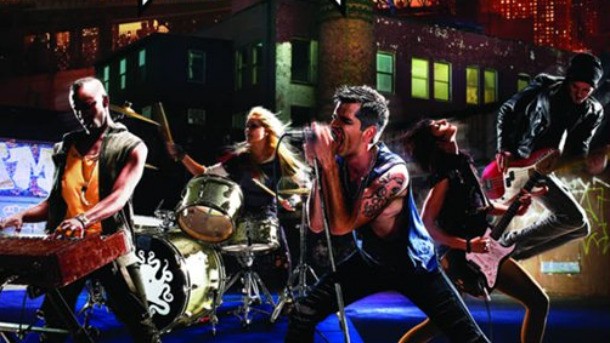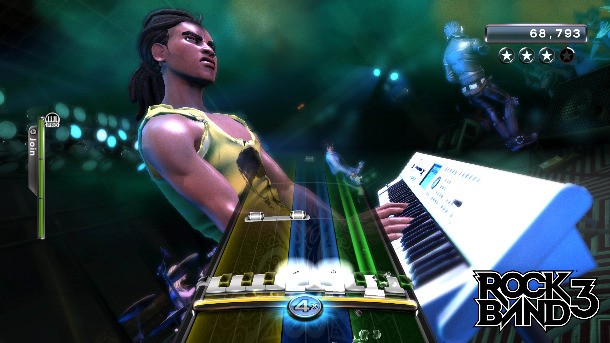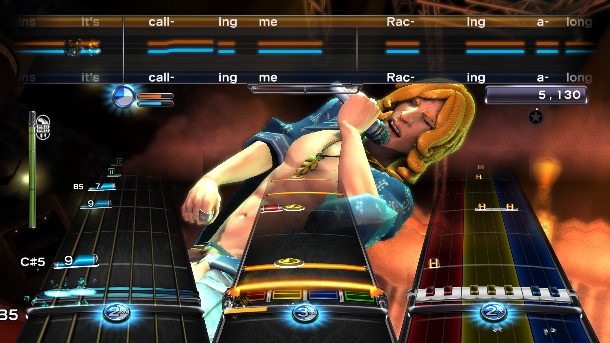The Past And Future Of Rock Band DLC

We dig deep with Harmonix's Chris Rigopulos to find out about unannounced DLC artists, how many songs have been downloaded in Rock Band's history, and why we won't see Rock Band 4 in 2011.
Harmonix has seen a lot of interesting shake-ups in the last year. Between their separation from MTV Games to the extinction of Rock Band's nearest rival, Guitar Hero, the music game market is quite different than it was just a few months ago.
How has Rock Band survived while some of its rivals have not? One of the biggest features that sets the Rock Band franchise apart from other video games is the extensive nature of its downloadable content. We were curious to learn more about exactly how much DLC plays into Harmonix's overall business strategy for Rock Band, so we asked Chris Rigopulos to help clarify several issues. Along the way, we found out a number of unannounced upcoming artists, how many individual accounts have downloaded Rock Band DLC, and the number of songs that have been downloaded to date. Hint: It's a lot.
Who are you and what do you work on related to the Rock Band franchise?
I’m Chris Rigopulos, Vice President of Strategy and Business Development for Harmonix. As Harmonix has transitioned back to being an independent studio, I’ve assumed responsibility for our music industry partnerships and for managing our digital publishing business, including Rock Band downloadable content.
Since Harmonix parted ways with MTV Games, has there been a change in how you approach DLC? With new DLC, does MTV or Viacom still get a cut of the profits? How about with DLC that was released prior to the sale of Harmonix?
At this point, we’ve effectively severed all ties with MTV, and all proceeds from Rock Band belong to Harmonix. In terms of our DLC approach, it was a collaborative effort between Harmonix and MTV. The bulk of the music we released in early 2011 was actually selected and put into the pipeline late last year before the sale. Now we’re going it alone, and fans will be getting their first glimpse this month at some of the music that the independent Harmonix has been working to bring to Rock Band. I don’t expect any dramatic changes to how we select music – well, I doubt you will see any more SpongeBob SquarePants packs.
Who are some of the unannounced artists we’ll see coming to Rock Band 3 in the coming months? Are there any new artists that haven’t been in the game before? Any returning favorites?
We have an amazing lineup of DLC scheduled for May, including new tracks from the Foo Fighters, Lady Gaga, and Ozzy Osbourne. First up, the Foo Fighters continue to add to their legacy with the release of their new album Wasting Light, which debuted at No. 1 on the Billboard 200 last week. On May 10, we’ll release a pack of their music, as well as two Pro Guitar/Bass upgrades to songs from the Rock Band catalog. I am a huge fan, and I’m looking forward to Tuesday. We will have all the details on Ozzy, Lady Gaga and more coming soon.
Among these artists coming to the game, what songs, albums, or song packs are you most excited about?
That’s really tough. I’m pretty excited about the entire May slate. Ozzy. Foo Fighters. Lady Gaga. All are Day One purchases for me. But I should mention that tucked in among these amazing May releases is a classic Peter Frampton track - “Do You Feel Like We Do” from Frampton Comes Alive. It’s this epic 13-minute jam with some blistering keys, brilliant guitar playing, and of course, the signature talk-box guitar effect. This masterpiece will pummel you, wear you down, but ultimately leave you begging for more. I can’t wait! Plus, it’s a great value on a dollars-per-minute basis.
Next up: How many songs have been downloaded by Rock Band 3 users?

How many songs are in the Rock Band catalog of songs at this point? How many artists is that split between?
We now have more than 2,700 songs available, across on-disc content, downloadable content and the Rock Band Network. That number continues to grow week by week and is pretty staggering considering we only started doing DLC in 2007. Rock Band features the most downloadable content available, out of any console video game, period. About 900 artists are represented among those 2,700 songs – we cover a lot of ground in terms of genre and time period. We have everybody from Otis Redding to The Beatles to Fleetwood Mac to Metallica to Bon Jovi to Avenged Sevenfold to Green Day to The Ramones to Duran Duran and much more!
On average, how many people download new songs for Rock Band every day?
I can’t give you a daily number, but since we started releasing DLC in 2007, nearly 5 million accounts have downloaded a song from the Rock Band catalog. With all of the negative press around the band genre, you might be surprised to learn that we still see more than a million unique users log on each month to play Rock Band and to pick up new music – and it’s not the same million players each month. Rock Band is a game that people can put down for a month to play Portal 2, or whatever new release captures their attention, and then fire up Rock Band again.
How many songs total have been downloaded over the life of the Rock Band franchise? Do you have a sense of how that number breaks down over each year of the franchise?
We recently hit a significant milestone; more than 100 million songs have been downloaded for Rock Band. It’s amazing. On behalf of Harmonix, I should probably take this opportunity to express our sincere thanks to all of our fans who have propelled us to these heights and to all of the artists whose music lies at the heart of the Rock Band experience.
How has the audience for DLC shifted over the life of the Rock Band franchise? Do you have a sense of what sort of players are downloading DLC these days? Are they devoted long-term players? Do you still see a lot of new users?
We have a core audience of devoted fans that have been with Rock Band since it first launched in 2007 and who continue to engage daily in our community and buy new DLC. We love them. They are the engine of our business. But there are always new people coming in for a variety of reasons. We’ve seen an unexpected spike in new users picking up Rock Band in the past months. We know there are a good number of Guitar Hero fans who were not ready to pack it in, and because their instruments are compatible, it seems like many of them are crossing over to Rock Band. We’re excited to welcome anyone into our community who is passionate about rhythm gaming and we hope that they’re excited about the depth of the Rock Band catalog.
With the launch of Rock Band 3, you began a new strategy with some songs. When pro guitar and bass is available, you charge an extra fee to attain those playable tracks. How has that strategy worked for the game? Will that continue to be the approach? What percentage of players that buy a song with pro-mode options also purchase the upgrade?
We created Pro mode for a segment of our users that feel compelled to explore new challenges in music gaming and begin to learn actual music skills. I think the strategy has broadly achieved what we set out to accomplish. The content economics for Pro are different in some important ways, and we’ve tried to adapt our approach to accommodate the variety of users who buy songs inside of Rock Band. Pro Guitar/Bass upgrades are very time consuming to author, and each chart represents many more hours of gameplay per track than our traditional DLC. We didn’t think it made any sense to author Pro Guitar/Bass into every track, and it didn’t seem right to pass the cost of Pro authoring on to fans who weren’t interested in learning an instrument. We feel confident that $0.99 to learn how to actually play a new song on guitar is a pretty good value relative to other options out there.
Next up: What about Rock Band 4?

What percentage of online-enabled Rock Band players has purchased a downloadable song?
I can’t tell you the exact figure, and it varies by platform, but it’s very high relative to other games with add-on content. We have an incredible breadth of music options that has broad appeal, it’s easy for people to browse music and find songs they love in our in-game music store, and the price of entry is pretty low. So, almost everyone who is set up to buy DLC has proven willing to buy something from us. We’re more focused on creating reasons for those people to keep coming back.
The Rock Band franchise has been unique within the world of video games – very few (if any) other titles have had such consistent DLC releases over such a long period of time. What are the advantages of pursuing such a robust DLC strategy? Without getting into specifics, can you explain the profitability of selling the game at retail versus selling DLC tracks online?
Great question. We’ve aggressively pursued a music platform strategy for a couple of reasons. First, ongoing music content was the obvious way to extend the life of the game and sustain interest. We’re trying to accommodate very diverse musical tastes among our fans, so we have to produce a lot of music in order to achieve a broad enough selection of music to keep our fans happy.
Second, DLC is the most efficient way to satisfy this demand. We can put 83 great songs on the Rock Band 3 disc, but nobody loves the entire soundtrack. They love some, like others, maybe find a new track they enjoy, and could do without the rest. A large, diverse DLC library allows people to customize their music content in the game to suit their individual preferences. You can’t achieve that efficiently with frequent retail disc releases.
Third, a big part of what we do is work closely with the artist community to understand their objectives and priorities, and coordinate our DLC releases accordingly. The digital platform gives us the schedule flexibility to pull that off. Disc releases are not well-suited to matching the natural rhythms of major events in the music industry. You can see this strategy in action during May, with the Foo Fighters and Lady Gaga both promoting new records and simultaneously releasing some of those tracks via Rock Band.
Finally, comparing profitability of discs vs. DLC is really an apples-to-oranges thing. Ideally, they should be complementary parts of the whole. DLC represents an ongoing opportunity to improve the economics of the disc release. This is substantial enough in our case that it might affect how we think about our retail strategy. For example, the price for Rock Band 3 was recently reduced to $19.99. A price cut like that has much more compelling economics when you consider that each unit sold represents the potential creation of a new DLC customer.
For all of these reasons, we’re not planning a Rock Band 4 disc release in 2011. Rock Band 3 is a big game with lots of available music content and lots of new goals and challenges. We want to give our fans the time to explore that fully. But rest assured that Harmonix is still developing new ideas and concepts to advance the Rock Band franchise, and we look forward to sharing those when the time is right.
How does an outage in a console’s online services, like the one currently being experienced with PlayStation Network, affect a developer like Harmonix?
Well, it’s obviously unfortunate for everyone involved. We just have to hope that PSN players will hang tight, take note of what is coming out these past few weeks, and come back to purchase all the great DLC that will be waiting for them when PSN comes back online!
Can you offer any sense of on which console you see the most or the least DLC activity? Is there a dramatic difference between the number of players who download songs on the 360, PS3, or Wii?
Well, the behavior of 360 and PS3 users is pretty similar, but if pressed, I would say 360 users buy the most DLC. They do have access to the largest catalog of music with all of the Rock Band Network content. Not surprisingly, our Wii users are a distant third. The Wii is a great console and does a lot of unique things really well, but DLC is a less integral part of the Wii user experience.
At Harmonix, are you still actively pursuing new songs and artists to go into the Rock Band DLC catalog? Or are the deals for songs worked out now so far in advance that you don’t find the need to continue looking for new artists or songs to enlist?
We’re still actively pursuing new music. There are some artists that aren’t yet represented in Rock Band or are sorely underrepresented that we want to work with in the future. But ultimately, the world is not our jukebox. We try to work closely with artists to release their music when it makes the most sense for them. Ozzy Osbourne is a good example. Ozzy is re-releasing two legendary albums – Diary of a Madman and Blizzard of Ozz – at the end of this month so this was the right time for Rock Band to participate in the excitement that this will undoubtedly create and release some amazing DLC from those albums.
Have any new doors opened with the apparent absence of Guitar Hero from the market moving forward? Has that allowed you to gain access to any artists that might previously have held exclusive contracts with Activision?
First, you have to assume that any of those contracts are still valid and binding. That said, exclusivity terms are typically finite, and we would love to have some of those bands bring their music to Rock Band. It just might take a little time in some cases to see that through.
How has Rock Band Network worked out as an avenue to deliver new content to users? Has RBN been a successful approach to content delivery from the perspective of Harmonix?
The Rock Band Network has been successful from our point of view – it’s opened up the Rock Band platform to any band that wants to be in the game. Harmonix simply doesn’t have the bandwidth to match the demand of artists who want to be a part of this platform. We’ve now published more than 1,000 RBN tracks, ranging from platinum-selling artists to independent self-released artists like this month’s Artist of the Month, Parry Gripp. And we have enjoyed the amazing creativity from the community in the types of songs selected, how the songs are authored, and how they are promoted. Exhibit A – Cleveland-based Affiance produced a genius YouTube video in support of their RBN track “Call to the Warrior.” It’s worth a look.

Get the Game Informer Print Edition!
Explore your favorite games in premium print format, delivered to your door.
- 10 issues per year
- Only $4.80 per issue
- Full digital magazine archive access
- Since 1991









